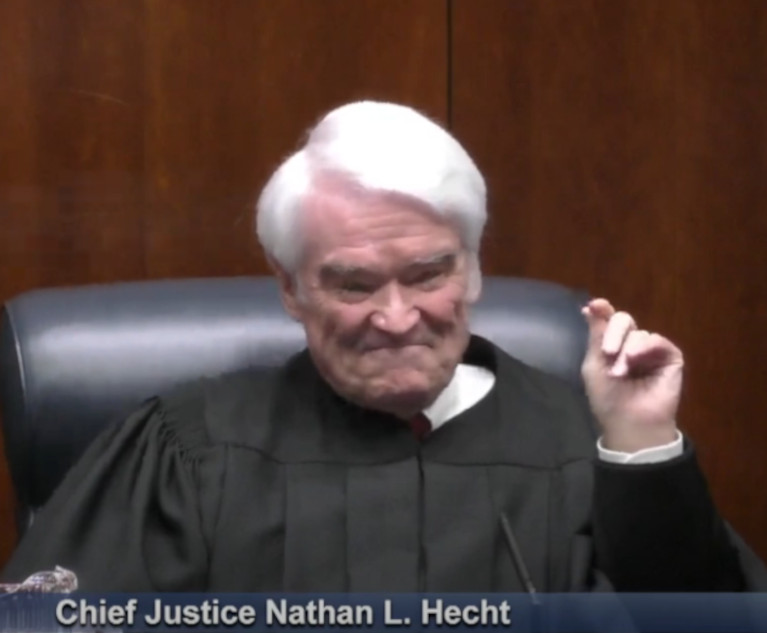Prosecutors Can't Claim Immunity From Ex-Judge's Wrongful Conviction Lawsuit, Judge Rules
Former Judge Suzanne Wooten, though, won't be allowed to appear on a Republican primary ballot.
December 26, 2019 at 02:59 PM
4 minute read
 Former State District Judge Suzanne H. Wooten, in Allen, Texas. Photo: Mark Graham
Former State District Judge Suzanne H. Wooten, in Allen, Texas. Photo: Mark Graham
Former Texas Judge Suzanne Wooten, who was exonerated in 2017 of a conviction that cost her a seat on the bench, will not be allowed on the Republican primary ballot this spring.
The Texas Supreme Court on Monday denied Wooten's request to declare her eligible to run as a district judge and force the Collin County Republican Party to place her name on the ballot. The party claimed she was ineligible because she didn't have a law license for the entire four years before the election, as required by the Texas Constitution.
But Wooten notched a win in federal court Monday after a judge ruled prosecutors involved in her wrongful conviction cannot claim qualified immunity from her wrongful prosecution claims. That ruling came from Judge Amos Mazzant of the Eastern District of Texas.
"Most of the case proceeds on, and we are happy with a majority of Judge Mazzant's rulings, especially that the defendants Roach, Milner, White and Collin County are still in the case," said Wooten's attorney, Scott Palmer of Dallas. "We look forward to proceeding with discovery and moving this case forward."
Wooten, who was elected to Collin County's 380th District Court in 2008, was wrongfully convicted of nine felonies in 2011, forced to resign and had her law license suspended. She was exonerated in a 2017 ruling that said even if the allegations against her were true, her actions simply weren't a crime under Texas law. She then got her law license back.
The central allegation in her conviction involved claims that co-defendants funneled money to Wooten's campaign in exchange for her to run against the incumbent. The co-defendants wanted Wooten, as judge, to issue favorable rulings in a pending family law case.
Wooten sued Collin County, former District Attorney John Roach Sr., Assistant District Attorney Christopher Milner, former Assistant Attorney General Harry White and then-Texas Attorney General Greg Abbott for malicious prosecution in May 2018. Mazzant's ruling Monday dismissed Abbott as a defendant.
Mazzant ruled this spring that they were not entitled to prosecutorial immunity because they took up the robe of law enforcement investigators rather than sticking to their duties as prosecutors. That sparked an interlocutory appeal to the U.S. Court of Appeals for the Fifth Circuit, which is still pending.
Meanwhile, Wooten was instructed to file an amended pleading with more details about her probation, arrest, and other things, to help the court decide whether qualified immunity applied. Qualified immunity protects government officials from being sued for mistakes, but not for plain incompetence or purposeful violations of the law.
Mazzant's ruling Monday concluded that qualified immunity does not apply at this stage.
The judge rejected Roach and Milner's arguments that they can't be liable because their involvement came before Wooten's indictment and conviction, since the attorney general's office took over the case in 2010. The court found Wooten raised sufficient allegations that the district attorney's office initiated criminal charges with no probable cause, which set in motion the constitutional violations.
Roach and Milner also couldn't dodge liability by arguing it was a grand jury that indicted Wooten, and a judge and jury that convicted her. The opinion noted that Wooten was claiming the defendants conducted a malicious investigation, arrested her with no probable cause and used facts they knew were untrue. Those allegations, if true, are enough for the claims to proceed, Mazzant ruled.
Mazzant wrote that because Wooten received a jury trial, which is the ultimate due process, she couldn't sue for procedural due process violations. However, he reached a different outcome regarding her substantive due process claims.
Wooten alleged that even if all the facts in her underlying wrongful conviction were true, her actions were never a crime under Texas law and the district attorney defendants knew all along.
Mazzant rejected Roach, Milner and White's claim that they used a reasonable interpretation of the law at the time and didn't anticipate the Court of Criminal Appeals would hold differently.
"Any reasonable official should know that creating and pursuing a criminal investigation, for something that is not a crime, based on political motivations, thereby destroying that person's reputation, employment, and livelihood is a violation of that person's constitutional rights," Mazzant wrote.
This content has been archived. It is available through our partners, LexisNexis® and Bloomberg Law.
To view this content, please continue to their sites.
Not a Lexis Subscriber?
Subscribe Now
Not a Bloomberg Law Subscriber?
Subscribe Now
NOT FOR REPRINT
© 2025 ALM Global, LLC, All Rights Reserved. Request academic re-use from www.copyright.com. All other uses, submit a request to [email protected]. For more information visit Asset & Logo Licensing.
You Might Like
View All
ExxonMobil Sues California AG Bonta, Environmental Groups for Advanced Recycling 'Smear Campaign'

2 Judges: Meet the New Chief Justice and the GC Who Just Rose to the Bench
3 minute read

Trending Stories
Who Got The Work
J. Brugh Lower of Gibbons has entered an appearance for industrial equipment supplier Devco Corporation in a pending trademark infringement lawsuit. The suit, accusing the defendant of selling knock-off Graco products, was filed Dec. 18 in New Jersey District Court by Rivkin Radler on behalf of Graco Inc. and Graco Minnesota. The case, assigned to U.S. District Judge Zahid N. Quraishi, is 3:24-cv-11294, Graco Inc. et al v. Devco Corporation.
Who Got The Work
Rebecca Maller-Stein and Kent A. Yalowitz of Arnold & Porter Kaye Scholer have entered their appearances for Hanaco Venture Capital and its executives, Lior Prosor and David Frankel, in a pending securities lawsuit. The action, filed on Dec. 24 in New York Southern District Court by Zell, Aron & Co. on behalf of Goldeneye Advisors, accuses the defendants of negligently and fraudulently managing the plaintiff's $1 million investment. The case, assigned to U.S. District Judge Vernon S. Broderick, is 1:24-cv-09918, Goldeneye Advisors, LLC v. Hanaco Venture Capital, Ltd. et al.
Who Got The Work
Attorneys from A&O Shearman has stepped in as defense counsel for Toronto-Dominion Bank and other defendants in a pending securities class action. The suit, filed Dec. 11 in New York Southern District Court by Bleichmar Fonti & Auld, accuses the defendants of concealing the bank's 'pervasive' deficiencies in regards to its compliance with the Bank Secrecy Act and the quality of its anti-money laundering controls. The case, assigned to U.S. District Judge Arun Subramanian, is 1:24-cv-09445, Gonzalez v. The Toronto-Dominion Bank et al.
Who Got The Work
Crown Castle International, a Pennsylvania company providing shared communications infrastructure, has turned to Luke D. Wolf of Gordon Rees Scully Mansukhani to fend off a pending breach-of-contract lawsuit. The court action, filed Nov. 25 in Michigan Eastern District Court by Hooper Hathaway PC on behalf of The Town Residences LLC, accuses Crown Castle of failing to transfer approximately $30,000 in utility payments from T-Mobile in breach of a roof-top lease and assignment agreement. The case, assigned to U.S. District Judge Susan K. Declercq, is 2:24-cv-13131, The Town Residences LLC v. T-Mobile US, Inc. et al.
Who Got The Work
Wilfred P. Coronato and Daniel M. Schwartz of McCarter & English have stepped in as defense counsel to Electrolux Home Products Inc. in a pending product liability lawsuit. The court action, filed Nov. 26 in New York Eastern District Court by Poulos Lopiccolo PC and Nagel Rice LLP on behalf of David Stern, alleges that the defendant's refrigerators’ drawers and shelving repeatedly break and fall apart within months after purchase. The case, assigned to U.S. District Judge Joan M. Azrack, is 2:24-cv-08204, Stern v. Electrolux Home Products, Inc.
Featured Firms
Law Offices of Gary Martin Hays & Associates, P.C.
(470) 294-1674
Law Offices of Mark E. Salomone
(857) 444-6468
Smith & Hassler
(713) 739-1250






